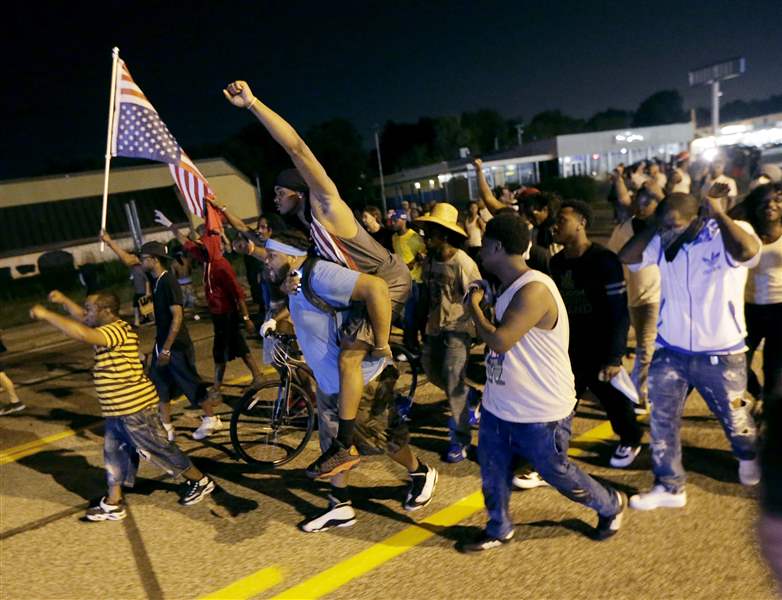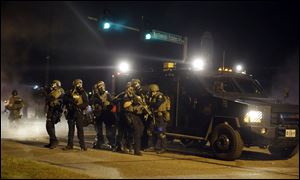
Ferguson police fire tear gas, stun grenades at protestors
National Guard enters as protests turn tense
8/19/2014
People march down the street after a standoff with police Monday, Aug. 18, 2014, during a protest for Michael Brown, who was killed by a police officer Aug. 9 in Ferguson, Mo. Brown's shooting has sparked more than a week of protests, riots and looting in the St. Louis suburb. (AP Photo/Charlie Riedel)
AP

People march down the street after a standoff with police.

People walk through the streets after a standoff.
FERGUSON, Mo. - Police fired tear gas and stun grenades at protesters in Ferguson, Missouri on Monday, after days of unrest sparked by the fatal shooting of an unarmed black teenager by a white policeman.
The police action came after hours of street protests that had been tense but mostly peaceful, Reuters witnesses said, adding there was also a projectile hurled from a crowd of protesters that shattered on the ground and erupted into flames.
Missouri's governor had lifted a curfew for the St. Louis suburb of Ferguson on Monday as National Guard troops were called out.
The National Guard deployment was the latest step by authorities to end the looting and burning of stores that have punctuated protests and stirred questions about race relations in the United States since the shooting death of Michael Brown, 18, on Aug. 9.
Governor Jay Nixon, who had declared a state of emergency for the town on Saturday and ordered the streets cleared for a curfew that ran from midnight to 5 a.m., said the National Guard would fall under the supervision of the Missouri Highway Patrol.
National Guard troops could be seen walking on the fringes of the gathering, keeping a distance from protesters.
President Barack Obama said he told the governor the use of the National Guard should be limited and urged healing, instead of violence. Attorney General Eric Holder will travel to Ferguson on Wednesday, Obama said.
National Guard troops entered the protest zone Monday night after a large crowd suddenly gathered at a Ferguson intersection, ignoring police orders to disperse and disrupting what had been a peaceful atmosphere.
About 100 people seemed to appear in the blocked-off street out of nowhere, and a few plastic water bottles flew through the air.
“You must disperse the street immediately,” police announced via megaphone, telling the crowd at Ferguson and West Florissant avenues to get on the sidewalk.
Instead, some protesters confronted police, and the guard moved in.
Within about 15 minutes, many of the protesters got on the sidewalk and started walking away.
But a few dozen young men remained in the street, even as local leaders tried to get them to comply. One leader, an older man, carried an armful of stuffed animals.

Police take up positions.
Police spread out in a thin line that filled the width of the four-lane street, marching slowly and trying to back up the defiant demonstrators.
Several people were arrested, including two women who were swarmed by about a dozen officers. CNN reported two arrests, including a man holding a milk bottle filled with pink liquid.
After about 45 minutes, about a dozen people remained in the street, but they were slowly walking away.
A woman walked around with a big bag, collecting discarded water bottles. And a drunken man smelling of booze wandered the area, looking for a liquor store.
Earlier Monday, the midnight-to-5 a.m. curfew was lifted. Peaceful protests had been underway in this St. Louis suburb over the police shooting death of Michael Brown, an unarmed black man.
A pathologist commissioned by the Brown family said his preliminary autopsy suggested no sign of a struggle, President Barack Obama said U.S. Attorney General Eric H. Holder Jr. would visit Ferguson on Wednesday, and Holder announced that FBI agents conducted several new interviews in the neighborhood where Brown was killed.
Dr. Michael Baden, a former New York medical examiner, said all but one of at least six gunshot wounds to Brown’s body were probably survivable. Baden said he believed Brown, 18, would not have been able to survive the bullet that hit the top of his head and traveled through his brain in the Aug. 9 shooting.
At the White House, Obama repeated a call for calm in the community, and said the amount of military-style equipment that police forces had been receiving from the federal government needed to be reviewed.
Obama said the Justice Department would carefully monitor events in Ferguson and the use of Missouri National Guard units. The use of the National Guard should be “limited and appropriate,” Obama said, noting that the decision to use the military units had been made by state officials.
It’s important to ensure that “peaceful protesters” have an opportunity to air their grievances, Obama said. At the same time, he said, law enforcement officers need to be able to protect communities against people who are using the unrest as an excuse for looting or violence.
“Let’s seek to heal rather than to wound each other,” Obama said at the White House.
He decried a “gulf of mistrust” between residents and police that exists in “too many communities.”
Holder did not identify the new FBI leads and said more than 40 FBI agents were canvassing the neighborhood where Brown was shot. He said a third autopsy on Brown’s body was being performed Monday “by one of the most experienced medical examiners in the United States military.”
The attorney general requested the public’s patience during the Justice Department’s investigation, but he voiced concern about the separate state investigation.
“The selective release of sensitive information that we have seen in this case so far is troubling to me. No matter how others pursue their own separate inquiries,” he said, “the Justice Department is resolved to preserve the integrity of its investigation.”
When Obama appeared on television at a McDonald’s restaurant on West Florissant Avenue in Ferguson, Andrew Williams urged the crowd to pay attention.
Williams, 59, of Ferguson was encouraged to hear the president say the National Guard would be acting in a supportive role.
“We don’t want to have a military state,” said Williams, a retired postal manager who served in the Army in Vietnam. He said the demonstrators who had been participating in violence were mostly from out of town. “A lot of people just want to get on television. The bad seeds are coming into the area.”
Although Ferguson was not be under a curfew Monday night, police told demonstrators — some waving roses at dusk — that they needed to keep moving and avoid congregating on sidewalks and parking lots.
A midnight-to-5 a.m. curfew had been in effect early Sunday and Monday as officials sought to quell unrest. But each night demonstrators clashed with police and troopers, who used tear gas to disperse the crowd. At least two people were shot overnight Sunday and seven people were arrested, and officials managing the police response complained they were pelted with bottles and Molotov cocktails as gunshots rang out.
Police said there were signs of a planned and coordinated attempt Sunday night to disrupt the St. Louis suburb and launch an advance on the police command post not far from the scene of Brown’s death.
Missouri Gov. Jay Nixon issued an executive order Monday to bring in the National Guard. Its “limited mission” will be to protect the command post so local law enforcement officials can protect peaceful demonstrators, he said in a statement. Community and civic leaders who have been in Ferguson for the recent demonstrations told reporters Monday that they were worried about another challenging night.
“We don’t want a repeat of last night,” said Akbar Muhammad of the Nation of Islam, who is based in St. Louis County.
Malik Shabazz, a former New Black Panthers leader who has been working in Ferguson trying to keep demonstrations peaceful, said he thought the National Guard would exacerbate the situation. “We have a tough job tonight,” he said, adding that he didn’t want peaceful demonstrations “overshadowed by agents and provocateurs.”